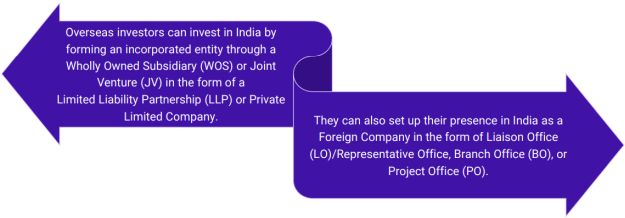
The main differences between the types of entities are detailed in this article:
TYPES OF INCORPORATED ENTITIES IN INDIA
Wholly Owned Subsidiaries (WOS)
A. Private Limited Company
The Companies Act, 2013 governs all Private Companies in India. This is an entity type where a foreign investor(s) owns the entire share capital. A Private Company is managed by its Directors (with at least one Resident Director). A Private Company is also required to be incorporated with some amount of paid-up share capital and a minimum of two subscribers. In this structure, the liability of members is limited to the extent of share capital held by them. This structure is more suitable for companies that are part of the manufacturing or trading sector.
Compliances include various mandatory reporting requirements with the Registrar of Companies and the Reserve Bank of India (RBI). There must be a minimum of four Director meetings per year (at least one meeting every 120 days) and a minimum of one shareholder meeting (AGM) per year.
B. Limited Liability Partnership (LLP)
LLPs in India are governed by The Limited Liability Partnership Act, 2008 and the Partnership Agreement (rules laid out and accepted by all Partners). An LLP is managed by its Partners (with at least one Resident Designated Partner). The primary requirement of the LLP is to have a capital contribution and a minimum of two designated Partners. In this structure, the liability of Partners is limited to the extent of capital contribution held by each of them. This structure is more suitable for companies operating within the service industry.
Unlike Private Companies, LLPs must adhere to a lesser number of compliances.
Joint Venture (JV)
A Joint Venture is the creation of a new entity where the ownership lies with two or more stakeholders. JVs are preferable when 100% FDI is not allowed for certain business activities or when exclusive ownership by overseas investors is not permitted. A Joint Venture can be formed either as a Company or as a Partnership.
A Joint Venture may create value in the following areas:
- Economies of Scale
- Innovation
- New Market Access
- Distribution Channels
- Goodwill
- Technology
UNINCORPORATED FORMS OF ENTITIES IN INDIA
Foreign Company -Liaison Office/Branch Office/Project Office (LO/BO/PO)
These entity types are extensions of the Foreign Company's headquarters, and hence, it has no separate legal existence per se. An LO/BO/PO is purely created to establish the presence of a Foreign Company in India. Therefore, it is not free to carry out business as usual activities in India, which can be undertaken by an Indian Private Company/LLP. It is also more regulated by the Reserve Bank of India (RBI) and the Registrar of Companies.
The activities permissible under these entities depend on the Foreign Exchange Regulations. As part of the eligibility criteria, the Foreign Company is required to have a profitable track record during the five Financial Years (in the home country) immediately preceding the incorporation of an entity and a net worth of USD 100,000 or more. Furthermore, the Authorized Representative should be a Resident Indian having a valid Permanent Account Number (PAN) and local address.
The main difference amongst all these three types of entities are given below:
Liaison Office (LO)/ Representative Office: This kind of entity is valid for a period of three years, and approval must be provided by the Reserve Bank of India. This is preferable if the company wants to merely promote its business activities in India. No invoicing can be raised from India, and the LO is not allowed to acquire any immovable property in India.
Branch Office (BO): A BO has no validity period. This entity type is preferable for companies who want to undertake business activities in India in the name of the Foreign Company, unlike a Liaison Office. A BO can raise an invoice in the name of the BO, and they are allowed to acquire any immovable property in India.
Project Office (PO): A Foreign Company can establish its presence in India in the form of a Project Office when any specific projects are assigned to a Foreign Company in India. So, for ease of operations, Foreign Companies may establish a Project Office, which is valid till the time of completion of the projects. A PO is allowed to acquire any immovable property in India as required for the project.
|
The mandatory registrations for all these entity types include PAN, TAN, Shops & Establishment Registration, and Professional Tax. Additionally, a GST and Import and Export Code (IEC) will be required for a Branch Office. |
Compliances include annual compliances and reporting any change in data that has been submitted at the time of registration. Changes must be reported to the Registrar of Companies (ROC) and Reserve Bank of India under FEMA. | A Foreign Company can establish itself as one kind of entity only, which means that two different types of establishment are not permitted from the same Foreign Company. |
In order to opt for the most effective structure for doing business in India, there are multiple factors associated with each entity structure with respect to compliances, limitation of liability, set up requirements, applicable laws, etc. A major factor is the tax implication, which is to be considered on the basis of the relevant tax treaties between the two countries. Overseas investors should consider all such factors before they opt to choose their optimal entity type in India.
The content of this article is intended to provide a general guide to the subject matter. Specialist advice should be sought about your specific circumstances.
